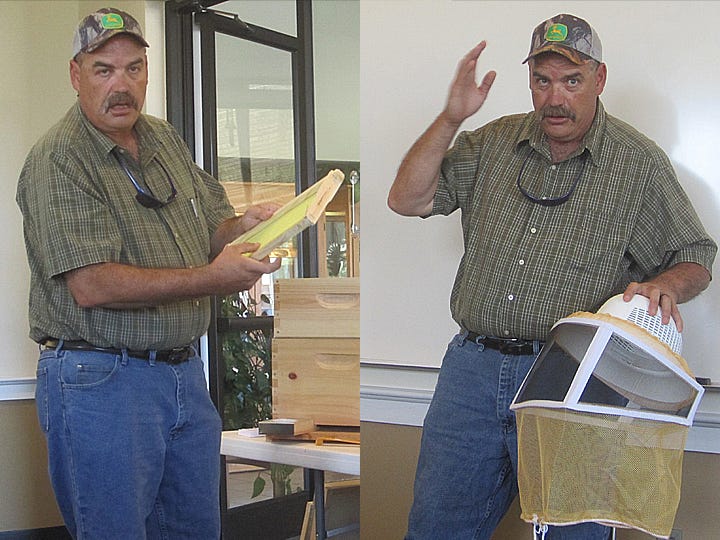
CRESTVIEW — More than two dozen residents attending the Crestview Public Library's First Tuesday lecture now know more about beekeeping.
Maj. Ken Bundrick, a senior Crestview Police officer, traded his patrolman's cap for a pith helmet with netting for the meeting, during which he explained the hobby's dos and don'ts.
He also displayed several items that Bundrick Honey Farms bees produce, including honey — "your simplest sugar," which the digestive system doesn't have to break down, he said.
Other products include bee pollen, beeswax and hand cream made from propolis, a waxy resin bees produce to seal holes in the hive.
Beekeeping 101
Bundrick offered advice for aspiring beekeepers, whose initial equipment investment can expect to be between $500 and $600 for a two-hive operation. Need-to-know information about beekeeping is as follows:
• "Stay off YouTube," Bundrick said. "There's so much bad information there. Someone thinks he's reinvented beekeeping. He uploads a video but forgets to go back and add, 'But my bees died.'"
• Suit up. "Nothing ruins things for a beekeeper more than not wearing protective gear," Bundrick said. "There's nothing like having a mean bee around your nose. If people say it doesn't hurt to get stung, they're lying." Start-up equipment — a wooden hive, protective clothes and a colony of bees — costs about $500.
• Blossoms on north county gallberry, blackberry and blueberry bushes are bees' favorites. Bees also make honey from cotton blossoms, but beekeepers dislike it because it granulates quickly.
• Planting flowers particularly attracts honeybees, but home gardeners should avoid insecticides.
• A hive can produce between about 60-80 pounds of honey a year, Bundrick said. It takes bees about 20 pounds of honey to make one pound of beeswax.
• Most wild honeybee colonies have fallen victim to insecticides and organic pests like mites; Bundrick said it's up to amateur and professional beekeepers to keep the species strong.
Contact News Bulletin Staff Writer Brian Hughes at 850-682-6524 or brianh@crestviewbulletin.com. Follow him on Twitter @cnbBrian.
This article originally appeared on Crestview News Bulletin: Crestview beekeeper shares advice on getting started in the hobby
